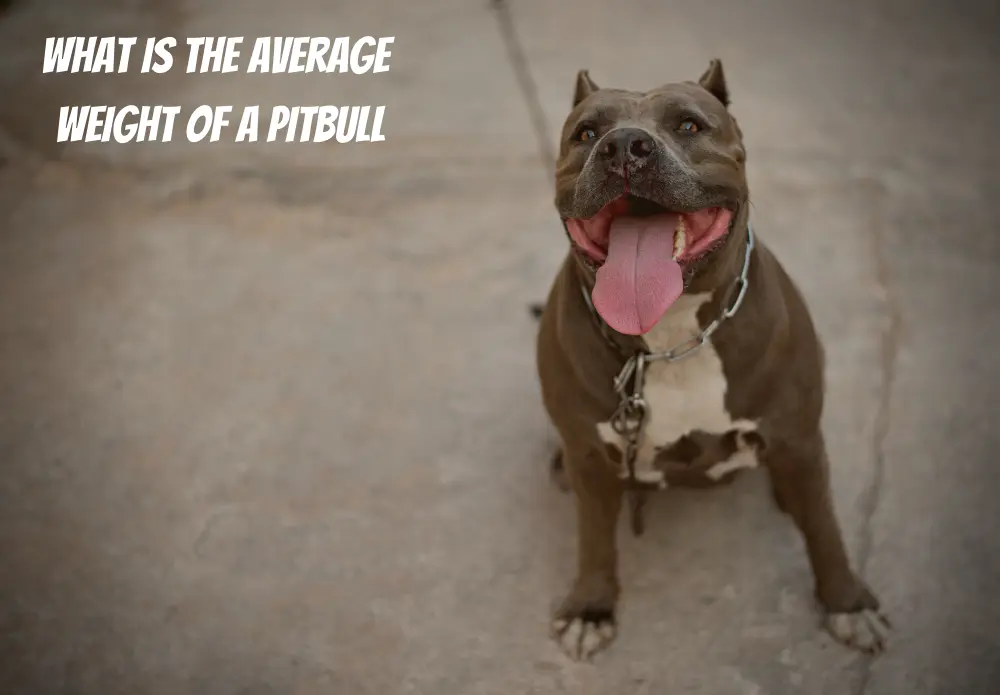It is essential to understand the growth and weight of your Pitbull because knowing how to monitor and adjust your Pitbull’s weight appropriately could be vital to its long life and well-being.
Pitbulls are genetically muscular and heavy compared to other dogs. Because Pitbulls have a unique body shape, you can’t necessarily judge their weight by looking at that of different dog breeds.
Pitbulls are heavier for their height than many other dogs thanks to being one of the most muscular dog breeds, Keep reading, and I will tell you all about the average weight and height that healthy Pitbulls should be during the different stages of their life.
What is the Average Weight of A Pitbull?
You must monitor your Pitbull pup closely to ensure the healthiest life possible. Monitor their growth by tracking their height and weight every month. Suppose they need to meet statistical averages for both of those things.
In that case, the puppy’s growth rates could be off. Growth spurts are common for Pit Bull puppies. A Pitbull puppy grows quickly, and its weight can change rapidly before slowing down as they develop into adult size.
Male Pitbull Growth
At 12 months, a male Pitbull will generally grow to be around 15 inches tall and weigh between 30 to 50 pounds. By 18 to 24 months, males will be 18 inches tall and up to 60 pounds.
Generally, American Pitbull Terrier males have a substantial growth period between 3 and 6 months. By then, they will be around 90% of their final adult height and about 70% of their final weight.
By 12 months old, they will be near their adult height. Still, they will continue to bulk up slowly for another year, depending on their genes and activities. American Pit Bull Terriers is a muscular, medium-sized dog breed.
Their height and weight should be proportionate with an athletic dog’s body type: not too heavy or too light for its height.
Female Pitbull Growth
Full-grown adult female Pitbulls must reach the average height and weight for their breed, which becomes even more critical if you plan on breeding your Pitbull for puppies.
An adult female Pitbull will be roughly 18 inches tall with an average of 40-50 pounds at 12 months old. A full-grown female can be 20 inches tall and weigh 60 pounds by maturity.
A question arises of what would happen if the female dog becomes pregnant. A pregnant Pitbull’s body undergoes significant changes during pregnancy, and her adult weight will change accordingly.
It is standard for a female dog to be 15-20% of its adult weight as they prepare to give birth or nurse puppies from a previous litter. The female puppy’s reproductive system is still developing, so avoiding breeding her until she has reached maturity makes sense.
Pit Bull Growth and Weight Chart
| Age | Male Weight | Female Weight |
| 1 month old | 3 – 5 pounds | 2 – 4 pounds |
| 2 months old | 5 – 15 pounds | 5 – 15 pounds |
| 3 months old | 10 – 20 pounds | 10 – 20 pounds |
| 4 months old | 15 – 25 pounds | 10 – 20 pounds |
| 5 months old | 15 – 30 pounds | 15 – 25 pounds |
| 6 months old | 20 – 35 pounds | 15 – 30 pounds |
| 7 months old | 20 – 40 pounds | 15 – 35 pounds |
| 8 months old | 25 – 45 pounds | 20 – 35 pounds |
| 9 months old | 25 – 50 pounds | 20 – 40 pounds |
| 10 months old | 25 – 50 pounds | 25 – 40 pounds |
| 11 months old | 30 – 55 pounds | 25 – 45 pounds |
| 12 months old | 30 – 55 pounds | 25 – 45 pounds |
| 2 years old | 35 – 60 pounds | 30 – 50 pounds |
Factors Affecting Pitbull Weight
Many different factors affect a Pitbull’s growth. Understanding each element can help you better understand the growth and development process.
Pitbull’s Genetics
Although genetics often determines the size, it is not always guaranteed. Some dogs can grow to be larger or smaller than their breed. Looking at the parents usually shows how large your dog can rise, though this can only give an estimation.
The parents are just a tiny part of a vast genetic puzzle. Your Pitbull may have genes that result in smaller, average, or larger offspring.
There is no natural way to tell until your dog fully matures. And, if you think your Pitbull may be mixed with another breed, you should do an at-home dog DNA test to learn more about their genetic buildup.
Pitbull’s Nutrition
Nutrition will play a key role in helping your puppy blossom. The food your Pitbull consumes daily depends on size, age, and activity level. This does not mean that overfeeding your Pitbull means he will grow bigger.
It’s important not to overfeed your dog as this leads to obesity and may even create other bone growth issues. It can also lead to other health conditions and add pressure to your Pitbull’s cardiac system.
The most important thing to note for his nutrition is to feed your Pitbull high-quality kibble that provides a well-balanced diet. A balanced diet should include high-quality meats, fiber, carbohydrates, healthy omega fats, vitamins, and minerals. There are specialized Pitbull foods that can provide specific nutrients for the breed.
Pitbull Growth Spurts
Growth spurts and plateaus can start during your Pitbulls growth stage. These spurts occur randomly and can speed up or slow the growing process. If you are worried about sudden changes in your puppy’s growth, consult your vet to see if your puppy is developing healthily.
Neutering And Spaying Your Pitbull
Spaying or neutering your dog at an early age does not stunt your Pitbull’s growth. However, neutering may impact their joints. Some studies suggested that early neutering or spaying can affect your dog’s growth plate, especially in larger canines.
A delay in the closure of growth plates may make your dog grow taller than usual. An unstopped growth can predispose them to joint disease later in their life. Be sure to ask your veterinarian when the best time is to spay or neuter your dog.
Pitbull’s Physical Health
Puppies who were ill for an extended time may have stunted growth. Poor health does not allow the body to reach its highest potential, so you should always check with your veterinarian to ensure your puppy is as healthy as possible.
Injury can also be a factor in the growth of a Pitbull. Please do not allow them to overexert themselves as they are growing. Always give your dog plenty of space to play so they don’t accidentally bump into anything and hurt themselves.
How to Maintain a Healthy Weight for Your Pitbull?
If you want to help your Pitbull maintain a healthy weight, there are a few things you can do:
Choose the Right Food
Feeding your Pitbull the right food is crucial for maintaining a healthy weight. Choose high-quality dog food for their age, breed, and activity level. Avoid foods that are high in calories or that contain fillers and additives.
Portion Control
Controlling your Pitbull’s portion sizes is also crucial for weight management. Overfeeding can lead to weight gain and obesity. Adjust portion sizes based on their weight and activity level.
Treats and Table Scraps
Limit the number of treats and table scraps you give your Pitbull, as these can add extra calories and contribute to weight gain. Instead, offer healthy snacks such as carrots, apples, or green beans.
Exercise Everyday
Providing your Pitbull with regular exercise is critical for maintaining a healthy weight. Exercise can include walks, runs, and games to help burn calories and promote a healthy lifestyle.
Monitor Your Pitbull’s Weight
Regularly check your Pitbull’s weight to ensure they are maintaining a healthy size. If you notice weight gain, adjust your diet and exercise routine accordingly. Also, talk to your veterinarian about your Pitbull’s weight concerns.
FAQs – Frequently Asked Questions
How Much Does a Full-Grown Pitbull Weigh?
A fully grown Pitbull can weigh 50 to 60 pounds, but some Pitbulls can reach a weight of 90 pounds.
When Does Pitbulls Stop Growing?
The Pitbull is a medium-sized, muscular dog. It takes time to grow to its full potential, and some dogs may not reach full height or weight for up to one year, depending on their genes.
That’s one reason why tracking your puppy’s developmental milestones during its first year is critical to lifelong health. Pitbulls typically stop growing between 12 – 15 months of age.
Expect that your Pitbull puppy’s height, weight, and general size will change radically during the first year of the pup’s life.
Are 80 Pounds Heavy for A Pitbull?
Yes, for an American Pitbull Terrier, 80 pounds is heavy because these dogs typically weigh around 60 pounds. Often, an 80-pound Pitbull is either overweight or tall or from a different sub-breed.
What’s the Heaviest a Pitbull Can Get?
The heaviest a Pitbull has ever gotten is 174 pounds. The dog’s name was Hulk, and he was trained to be a professional guard dog. One thing to note is that often people confuse other breeds, such as the American Bully and Staffordshire Terrier, with the Pitbull and pool them into one breed.
They are all different breeds with different sizes and weights, whereas the Pitbull is a breed of its own.
Can Pitbulls Get to 100 Pounds?
Yes, in some rare cases, Pitbulls have grown past 100 pounds, but usually, they grow to 60 pounds. You should not feed your Pitbull too much to increase its weight but keep it as the vet recommends.
Pitbulls need a protein diet but not too much, as they can quickly get obese.
Conclusion
American Pitbulls are a wonderful breed with beautiful muscles and body structure. Their structure looks best natural and should not be modified by malnutrition or overfeeding as it can cause them severe health problems.
If you have a Pitbull, follow the mandatory diet chart or consult your vet for the best guidance on the weight of your Pitbull. It is your responsibility to give your Pitbull the best life possible.






